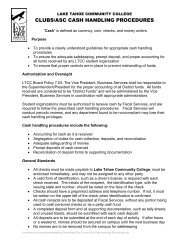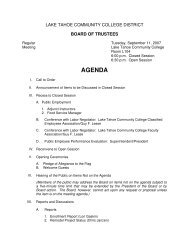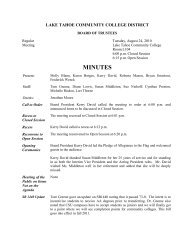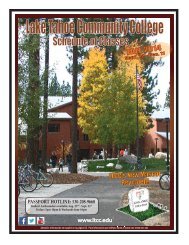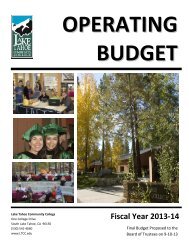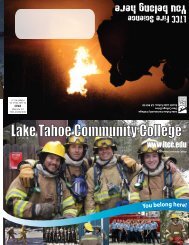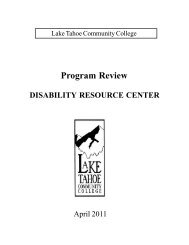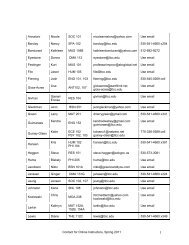LTCC CATALOG <strong>2010</strong>-<strong>2011</strong> 153 ETHNIC STUDIES - FIRE SCIENCEETH 203C HISTORY OF MEXICO: 1910 TOPRESENTLecture 4, Lab 0, Units 4This course, <strong>the</strong> third of a three-part series, covers <strong>the</strong> major sociohistoricand political events in <strong>the</strong> history of Mexico from <strong>the</strong> MexicanRevolution to <strong>the</strong> present. Topics to be covered include eventsduring <strong>the</strong> Mexican Revolution, rebuilding <strong>the</strong> nation, <strong>the</strong> muralistmovement, establishing <strong>the</strong> system of one official political party, <strong>the</strong>Mexican Economic Miracle of <strong>the</strong> 50's and 60's, social strife andeconomic collapse, and triumph of an opposition party.Transfers to CSU, UNR, UCADVISORY: ENG 152 or equivalent.ETH 231 SPECIAL PROJECTSUnits 1-4This course is designed for students wishing to pursue a specific topicof study. Emphasis is placed on individualized instruction and studentproject planning. The student must arrange for project and creditapproval by <strong>the</strong> instructor prior to registering for this course.Transfers to CSUETH 291 SPECIAL PROJECTSUnits 1-4This course is designed for students wishing to pursue a specifictopic of study in occupational, technical or college preparatory areas.Emphasis is placed on individualized instruction and student projectplanning. The student must arrange for project and credit approval by<strong>the</strong> instructor prior to registering for this course.FIRE SCIENCEA.A. DEGREEAn A.A. Degree is offered in <strong>the</strong> field of Fire Science. For majorrequirements, see page 66.CERTIFICATE OF ACHIEVEMENTA Certificate of Achievement is offered in <strong>the</strong> field of Fire Science. Forrequirements, see page 89.THE FOLLOWING COURSES IN THIS SUBJECT AREA MAYBE CHALLENGED: FIR 101.FIR 101 FIRE PROTECTION ORGANIZATIONLecture 4 Lab 0, Units 4(Formerly FIR 151)This course provides an introduction to fire protection. Topics coveredinclude career opportunities in fire protection and related fields, fireloss analysis, organization and function of public and private fireprotection services, and laws and regulations affecting <strong>the</strong> fire service.Students will be introduced to fire service nomenclature, basic firechemistry and physics, fire protection systems, and fire strategy andtactics.Transfers to CSUFIR 102 FUNDAMENTALS OF FIRE PREVENTIONLecture 4 Lab 0, Units 4(Formerly FIR 152)This course provides fundamental information regarding <strong>the</strong> historyand philosophy of fire prevention. Topics covered include <strong>the</strong>organization and operation of a fire prevention bureau, use offire codes, identification and correction of fire hazards, and <strong>the</strong>relationship of fire prevention with fire safety education, detection andsuppression systems.Transfers to CSUADVISORY: Completion or concurrent enrollment in FIR 101.FIR 103 FIRE PROTECTION EQUIPMENT ANDSYSTEMSLecture 4 Lab 0, Units 4(Formerly FIR 159)This course provides information relating to <strong>the</strong> features of designand operation of fire detection and alarm systems. Topics coveredinclude heat and smoke control systems, special protection andsprinkler systems, water supply for fire protection and portable fireextinguishers.Transfers to CSUADVISORY: Completion or concurrent enrollment in FIR 101.FIR 104 BUILDING CONSTRUCTION FOR FIREPROTECTIONLecture 4 Lab 0, Units 4(Formerly FIR 154)This course examines <strong>the</strong> components of building construction thatrelate to fire safety. The elements of construction and design of structuresare shown to be key factors when inspecting buildings, preplanning fireoperations, and operating at fires. Students will study <strong>the</strong> developmentand evolution of building and fire codes in relationship to past fires inresidential, commercial, and industrial occupancies.Transfers to CSUADVISORY: Completion or concurrent enrollment in FIR 101.FIR 105 FIRE BEHAVIOR AND CO<strong>MB</strong>USTIONLecture 4 Lab 0, Units 4(Formerly FIR 160)This course presents <strong>the</strong>ory and fundamentals of how and why firesstart and spread, and how <strong>the</strong>y are controlled. Topics covered includean in-depth study of fire chemistry and physics, fire characteristics ofmaterials, extinguishing agents, and fire control techniques.Transfers to CSUADVISORY: Completion or concurrent enrollment in FIR 101. MAT 154 or 154AAwith a grade of "C" or better or equivalent. One year of high school chemistry.FIR 106 PRINCIPLES OF FIRE AND EMERGENCYSERVICES SAFETY AND SURVIVALLecture 4 Lab 0, Units 4This course introduces <strong>the</strong> basic principles and history related to <strong>the</strong>national firefighter life safety initiatives, focusing on <strong>the</strong> need forcultural and behavior change throughout <strong>the</strong> emergency services.Topics covered include <strong>the</strong> history of fire service culture; <strong>the</strong> nationalcontext of health and safety; training, equipment, and emergencyresponse; organizational health and safety profile; risk management;and public education for fire prevention.Transfers to CSUADVISORY: Completion or concurrent enrollment in FIR 101.Environmental Science - Ethnic Studies - Fire Science
FIRE SCIENCE154LTCC CATALOG <strong>2010</strong>-<strong>2011</strong>FIR 131 SPECIAL TOPICSUnits 1-4This course is designed to meet <strong>the</strong> needs of students for studies inareas of special interest. Topics and credit will vary from quarter toquarter and will be included under this cover title published in <strong>the</strong>schedule for <strong>the</strong> quarter in which <strong>the</strong> course will be offered.Transfers to CSUFIR 132 OCCUPATIONAL WORK EXPERIENCELecture 0, Lab 0, Units 1-6Occupational Work Experience is for students who are employed injobs related to <strong>the</strong>ir educational or occupational goals. This programextends knowledge gained in <strong>the</strong> classroom to <strong>the</strong> workplace, helpsstudents identify new and challenging objectives at work, andencourages professional growth and advancement.Transfers to CSUCOREQUISITE: Students must be available to work or volunteer 4 to 40 hoursper week for an approved business and must have an application on file each quarterenrolled.REPEATABILITY: May be repeated up to a total of twenty-four (24) units, six unitsmaximum per quarter.FIR 133 OCCUPATIONAL WORK EXPERIENCE -INTERNSHIPLecture 0, Lab 0, Units 1-6Occupational Work Experience Internship is supervised placementat a worksite related to <strong>the</strong> student’s educational or occupationalgoals. The program will assist students in acquiring desirable workexperience, attitudes, and awareness of career opportunities in <strong>the</strong>irchosen field of study.Transfers to CSUCOREQUISITE: Students must be available to work or volunteer 4 to 40 hoursper week for an approved business and must have an application on file each quarterenrolled.REPEATABILITY: May be repeated up to a total of twenty-four (24) units, six unitsmaximum per quarter.FIR 153 FIRE HYDRAULICSLecture 4, Lab 0, Units 4Water is <strong>the</strong> most practical and commonly used agent for extinguishingfires. This course covers <strong>the</strong> properties of water and how water affects<strong>the</strong> decisions and actions on <strong>the</strong> fire ground. O<strong>the</strong>r topics coveredinclude understanding fire extinguishment <strong>the</strong>ory as it relates tofoam and water, calculating <strong>the</strong> friction loss in elevation and hoseassemblies, and developing fire stream strategies and tactics on <strong>the</strong> fireground in relation to fire hydraulics.ADVISORY: MAT 152B or MAT 152BB with a grade of “C” or better or equivalent.FIR 161A IN-SERVICE TRAINING FORFIREFIGHTERS, MODULE ALecture 0, Lab 8.25, Units 2.75This course is part one of a four-part sequence designed to update,improve and assess <strong>the</strong> knowledge, skills and abilities of fire servicepersonnel. Topics covered include structure fires, emergency medicalservices, rescue, fire prevention, hazardous materials, and sexualharassment awareness and prevention training.PREREQUISITE: Firefighter I certification through <strong>the</strong> Califiornia State FireMarshal.REPEATABILITY: May be repeated 2 times.FIR 161B IN-SERVICE TRAINING FORFIREFIGHTERS, MODULE BLecture 0, Lab 16.75, Units 5.5This course is part two of a four-part sequence designed to update,improve and assess <strong>the</strong> knowledge, skills and abilities of fire servicepersonnel. Topics covered include structure fires, emergency medicalservices, rescue, fire prevention, hazardous materials, and emergencyscene safety.PREREQUISITE: Firefighter I certification through <strong>the</strong> Califiornia State FireMarshal.REPEATABILITY: May be repeated 2 times.FIR 161C IN-SERVICE TRAINING FORFIREFIGHTERS, MODULE CLecture 0, Lab 25, Units 8.25This course is part three of a four-part sequence designed toupdate, improve and assess <strong>the</strong> knowledge, skills and abilities of fireservice personnel. Topics covered include structure fires, wildlandfires, emergency medical services, rescue, fire prevention, hazardousmaterials, and prevention of back injuries.PREREQUISITE: Firefighter I certification through <strong>the</strong> Califiornia State FireMarshal.REPEATABILITY: May be repeated 2 times.FIR 161D IN-SERVICE TRAINING FORFIREFIGHTERS, MODULE DLecture 0, Lab 33.25, Units 11This course is part four of a four-part sequence designed to update,improve and assess <strong>the</strong> knowledge, skills and abilities of fire servicepersonnel. Topics covered include structure fires, wildland fires,emergency medical services, rescue, fire prevention, hazardousmaterials, weapons of mass destruction, and driver/operator training.PREREQUISITE: Firefighter I certification through <strong>the</strong> Califiornia State FireMarshal.REPEATABILITY: May be repeated 2 times.FIR 167 WILDLAND FIRE SAFETY AND HANDCREW OPERATIONS (I-100, L-180, S-130, S-190)Lecture 3.25, Lab .75, Units 3.5This is a comprehensive course in <strong>the</strong> safety aspects of fightingwildland fires and <strong>the</strong> methods and procedures for hand crews,including instruction in specialized equipment, physical fitness, andfire behavior and suppression. Backfire, burnout procedures and lineconstruction will also be covered. This course includes a field exerciseand successful completion results in a certificate from <strong>the</strong> NationalWildfire Coordinating Group (NWCG).FIR 170A LAKE TAHOE BASIN FIRE ACADEMY,PART 1Lecture 8.75, Lab 5.75, Units 10.75This course is part one of a three-part sequence which culminates in<strong>the</strong> instructional requirement for Firefighter I certification through<strong>the</strong> California State Fire Marshal's office. Instruction includes fireorganization and responsibility, cultural diversity, safety, use of selfcontainedbreathing apparatus, fire service apparatus and equipmentoperation, hose and nozzles, ladders, ropes and knots, incidentcommand system, and physical conditioning. This is a physicallydemanding course and <strong>the</strong> curriculum conforms to standards forcertification by <strong>the</strong> California State Board of Fire Services.ADVISORY: Students are advised that this is a physically demanding course. A healthclearance is required.




